|
|
|
Sort Order |
|
|
|
Items / Page
|
|
|
|
|
|
|
| Srl | Item |
| 1 |
ID:
148793
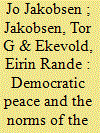

|
|
|
|
|
| Summary/Abstract |
The democratic peace literature has convincingly shown that democracies do not fight other democracies. Theoretical explanations of this empirical phenomenon often claim that the citizenry in democracies prefers peaceful resolution of interstate conflicts. Still, there is a dearth of studies exploring the public’s preferences and values directly. We seek to rectify this by investigating, in a novel way, the relationship between regime type and citizens’ bellicosity. A comprehensive multilevel research design is employed, with data spanning 72 countries over the period of 1981–2008. This enables us to test one of the theoretical mainstays of the democratic peace thesis, viz., that regime type helps shape individuals’ attitudes toward war-fighting. Our results lend special support to normative democratic peace theory: Citizens of democracies are significantly more pacifistic than citizens of non-democracies. This result upholds when we rigorously control for other relevant factors, including specific characteristics of individuals and rival theoretical explanations.
|
|
|
|
|
|
|
|
|
|
|
|
|
|
|
|
| 2 |
ID:
089906
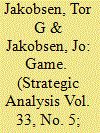

|
|
|
|
|
| Publication |
2009.
|
| Summary/Abstract |
This article employs game theory to explain the 2003 US-led invasion of Iraq, seeking in particular to improve the understanding of why the Iraqi dictator chose a path of action that ultimately led to his downfall. The main argument is that Saddam Hussein lacked information about his opponent's payoffs and was lured by the possibility of becoming the undisputed leading figure of the Arabic world. The analysis shows that even if the threat of an allied attack in the end proved credible, Iraq could - quite rationally - have chosen to stand firm.
|
|
|
|
|
|
|
|
|
|
|
|
|
|
|
|
| 3 |
ID:
089017
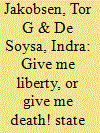

|
|
|
|
|
| Publication |
2009.
|
| Summary/Abstract |
Recent research on the causes of civil war seeks to identify whether group grievances, or opportunity for organisation, motivates rebellion. Similarly, scholars debate whether ethnicity matters in civil war due to group grievances or the opportunity to mobilise. We introduce the lack of empowerment rights, defined as social, political and economic empowerment directly and conditionally in models of civil war onset using novel methods and data. We find no direct effect of repression of rights on war, but higher ethnic fractionalisation increases the risk independently. Nonetheless, higher levels of repression condition the effects of ethnic fractionalisation in ways that maintain peace. State policies that dis-empower people under conditions of high fractionalisation actually reduce the chance of civil war. We do not find that high fractionalisation is only related to lower level armed conflict as some have suggested, but it seems to explain onsets of civil wars above 25 deaths but lower than 1,000 and conflict measured above 1,000 deaths for the period of study that our data allow. The conditional effects of repression and ethnic fractionalisation explain onsets at both levels of war. Our findings are generally unsupportive of the view that grievances due to lack of ethnic group rights drive civil war, but it seems that the opportunity to mobilise does.
|
|
|
|
|
|
|
|
|
|
|
|
|
|
|
|
| 4 |
ID:
148117
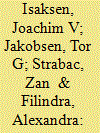

|
|
|
|
|
| Summary/Abstract |
Using data from 16 countries and employing multilevel analysis that encompasses the national, regional, and individual levels, we find that both economic and social factors trigger anti-immigrant attitudes among Europeans. Regional per capita GDP is positively correlated with tolerant attitudes while the regional unemployment rate drives prejudice. We find a moderating relationship between immigrant population size and per capita GDP, which suggests that, as the size of the immigrant population increases, prejudice rises but only in poorer regions. In more affluent regions, an increase in the immigrant population corresponds to increased tolerance.
|
|
|
|
|
|
|
|
|
|
|
|
|
|
|
|
| 5 |
ID:
166609
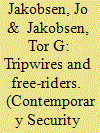

|
|
|
|
|
| Summary/Abstract |
This article investigates the relationship between U.S. overseas troops and the willingness of the citizens of host states to fight for their country. The study joins the long-running debate about burden-sharing and free-riding among U.S. allies. Unlike most previous empirical studies, we focus on non-material or intangible measures of the underlying concepts. Our dependent variable estimates the proportion of citizens expressing a willingness to fight for their country. Scores at the aggregate-national as well as the individual level are shaped by the presence of U.S. military forces, which act as a “tripwire” signaling credible security commitments. This increases opportunities of (non-material) free-riding. We present both bivariate and multivariate analyses covering the period 1981–2014 to test this supposition. Findings indicate that once U.S. troop levels reach a certain threshold (between 100 and 500 troops), citizens’ willingness to fight drops significantly. This likely reflects non-material free-riding.
|
|
|
|
|
|
|
|
|
|
|
|
|
|
|
|
|
|
|
|
|